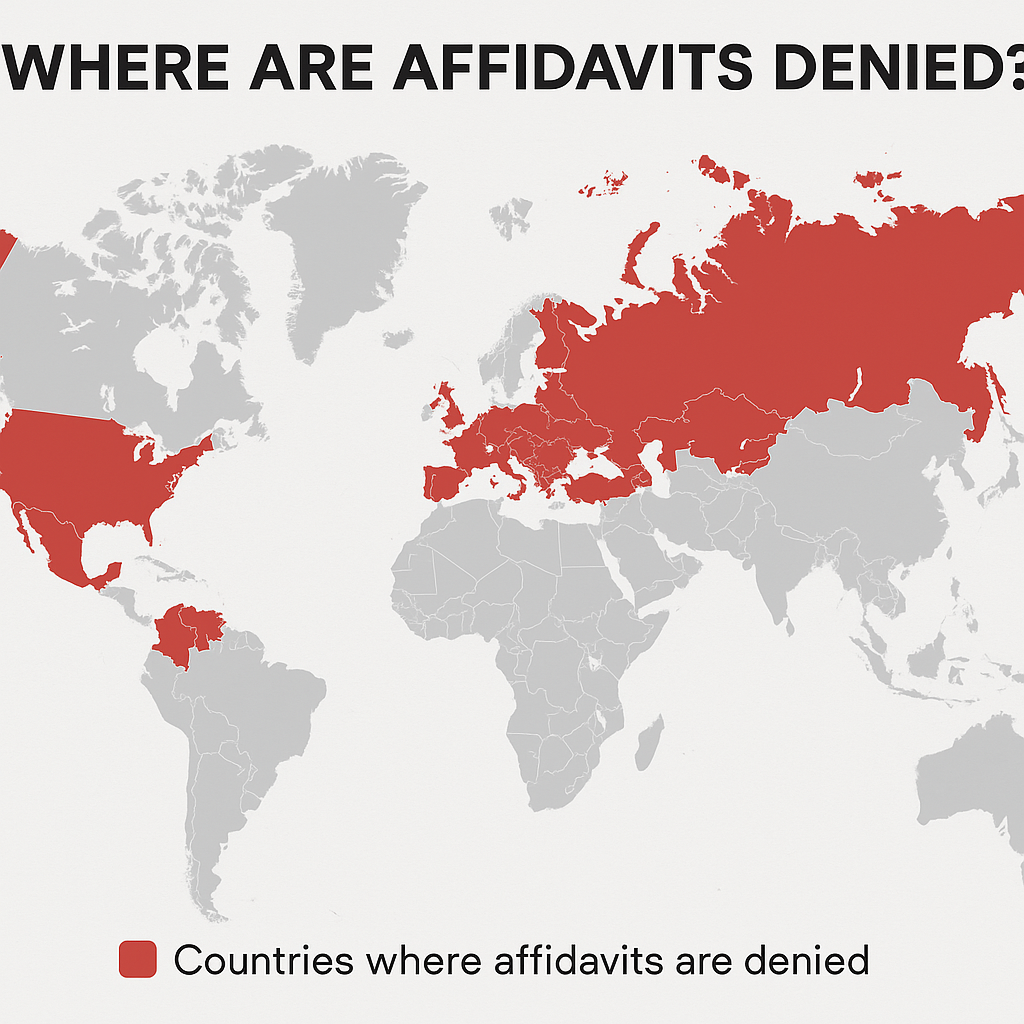Affidavit a Globally Accepted Document, but its recognition depends on the legal system and purpose. Below is a breakdown of countries that accept affidavits and how they are treated worldwide.
Table of Contents
1. Common Law Countries (Widely Accept Affidavits)
Affidavits are a standard legal document in common law countries, where they serve as sworn statements of fact. These countries include:
✅ United States – Used in courts, immigration, business, and financial matters.
✅ United Kingdom – Accepted in legal cases, business transactions, and declarations.
✅ Canada – Common in legal proceedings, notarized affidavits required in some cases.
✅ Australia – Required for court proceedings and statutory declarations.
✅ India – Used in legal documentation, property disputes, and official procedures.
✅ South Africa – Recognized in courts, financial dealings, and legal transactions.
✅ New Zealand – Used for sworn statements in courts and business matters.
📌 Notary Requirement: In most common law countries, an affidavit must be sworn before a notary public, commissioner of oaths, or judicial officer.

2. Civil Law Countries (Limited Acceptance)
Countries following a civil law system often prefer notarized declarations instead of affidavits. However, some do accept affidavits in specific cases:
✅ Germany – Affidavits are rarely used; courts prefer direct witness testimony.
✅ France – Not common, but a “declaration sur l’honneur” (sworn declaration) is used instead.
✅ Italy – Limited use; notarized statements are more common.
✅ Spain – Affidavits are not widely used, but notarized statements serve a similar function.
✅ Japan – Limited use, but can be accepted if notarized properly.
📌 Alternative Documents: In many civil law countries, notarized declarations or sworn witness testimonies are required instead of affidavits.
3. Countries That May Require Special Authentication
Some countries accept affidavits only if properly authenticated through:
✔ Apostille Certification (for countries under the Hague Apostille Convention).
✔ Legalization by Embassies/Consulates (for non-Apostille countries).
These requirements apply in:
✅ China – Affidavits must be notarized and legalized for international use.
✅ Russia – Accepted if legalized or apostilled.
✅ UAE (United Arab Emirates) – Requires attestation from a notary and Ministry of Foreign Affairs.
✅ Saudi Arabia – Requires attestation and authentication.
✅ Brazil – Requires notarization and translation for legal use.
📌 Tip: If using an affidavit internationally, check if apostille or consular legalization is needed.
Is an Affidavit a Globally Accepted Document?
🔹 Yes, in common law countries.
🔹 Limited acceptance in civil law countries (notarized declarations are preferred).
🔹 Requires authentication in some countries (apostille, legalization).
If you plan to use an affidavit internationally, always check local legal requirements to ensure acceptance. 🚀

List of Countries That deny Affidavit
Affidavits are generally not widely recognized or have limited acceptance in certain countries, particularly those with civil law systems or strict document authentication rules. Below is a list of countries where affidavits are not accepted or require special procedures before being recognized:
1. Countries That Do Not Accept Affidavits (Prefer Other Documents)
These countries typically do not accept affidavits as legal proof because they rely on notarized declarations or direct witness testimony instead:
❌ France – Uses “Déclaration sur l’honneur” (sworn declaration) instead of affidavits.
❌ Germany – Courts do not recognize affidavits; witness testimony is required.
❌ Italy – Prefers notarized statements over affidavits.
❌ Spain – Affidavits have no legal value unless notarized and authenticated.
❌ Netherlands – Uses statutory declarations or direct evidence instead of affidavits.
❌ Japan – Affidavits are uncommon and not legally binding unless notarized.
❌ South Korea – Courts prefer written sworn statements instead of affidavits.
❌ China – Affidavits are not legally recognized; notarization and legalization are required.
❌ Taiwan – Prefers official government certifications over affidavits.
📌 Alternative Documents Used:
- Notarized Declarations
- Witness Testimonies in Court
- Sworn Statements before a Notary
2. Countries That Require Strict Legalization for Affidavits
In these countries, an affidavit is not outright denied, but it requires apostille certification or embassy legalization before being accepted:
⚠ United Arab Emirates (UAE) – Affidavits need notarization, attestation, and Ministry of Foreign Affairs approval.
⚠ Saudi Arabia – Affidavits must be attested by the Ministry of Foreign Affairs and sometimes translated.
⚠ Qatar – Requires notarization and authentication from embassy and local authorities.
⚠ Brazil – Affidavits are not commonly used; notarization and translation are required for legal recognition.
⚠ Russia – Requires affidavits to be notarized and legalized by consulates before acceptance.
⚠ Mexico – Some institutions require affidavits to be notarized and apostilled for legal use.
📌 Requirement: Apostille (if under the Hague Convention) or consular legalization.
3. Countries Where Affidavits Are Not Commonly Used
These countries do not outright deny affidavits but generally do not rely on them for legal purposes:
🔹 Sweden – Uses written statements in court rather than affidavits.
🔹 Denmark – Affidavits have no legal standing; witness statements are preferred.
🔹 Norway – Written or verbal sworn statements are used in legal proceedings.
🔹 Finland – Affidavits are uncommon and not legally binding unless notarized.
🔹 Turkey – Uses notarized statements instead of affidavits in most cases.
Where Are Affidavits Denied?
🔴 Not Accepted: France, Germany, Italy, Spain, Japan, China, South Korea, Netherlands, Taiwan.
🟠 Strict Legalization Required: UAE, Saudi Arabia, Qatar, Brazil, Russia, Mexico.
🟡 Not Commonly Used: Sweden, Denmark, Norway, Finland, Turkey.
If you need to use an affidavit in any of these countries, it’s best to check local legal requirements and consider notarization, translation, or alternative documents. 🚀
Key points about its global recognition:
1. Legally Recognized in Most Countries
- Affidavits are widely used in common law countries like the United States, United Kingdom, Canada, Australia, and India.
- They serve as sworn statements of fact, signed under oath before a notary public, commissioner of oaths, or judicial officer.
2. Variations in Legal Systems
- Civil law countries (e.g., France, Germany, Japan) may not rely on affidavits as much as common law systems. Instead, they prefer notarized declarations or witness testimonies.
- Some jurisdictions may require affidavits to be notarized, apostilled, or legalized for international acceptance.
3. Limited Use in Some Cases
- While widely accepted in personal, legal, and corporate matters, affidavits may not always replace other forms of proof required by courts, banks, or government agencies in some countries.
- Some countries require court testimony instead of affidavits in legal proceedings.
4. International Recognition
- If an affidavit needs to be used across borders, it may require apostille certification (for countries under the Hague Apostille Convention) or legalization through embassies/consulates.
- Some international organizations and agreements recognize affidavits, but they may require specific formats or authentication.
Conclusion
An affidavit is a widely accepted document globally but not universally. Its acceptance depends on the country’s legal system, purpose, and requirements for authentication. If using an affidavit internationally, check local laws and authentication procedures to ensure its validity.

